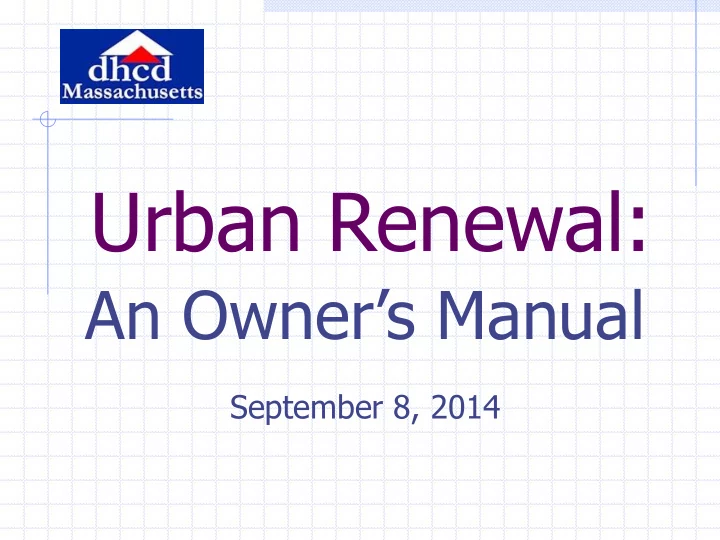

Urban Renewal: An Owner’s Manual September 8, 2014
Urban Renewal M.G.L. c. 121B – Enabling Legislation 760 CMR 12.00 - Implementation Regulations
Urban Renewal: An Overview What: A strategy to redevelop substandard, decadent and blighted open areas Why: To create an environment that supports private investment and promotes sound growth When: As a last resort when redevelopment can’t be accomplished by regulatory powers of municipality or by private sector alone How: Urban renewal planning; public actions; exemption from c. 30B procurement; land use restrictions Who: Redevelopment authorities acting as community’s developer and operating outside of government control; can do what a municipality is not able to do
Urban Renewal: What? Different from other development tools Redevelopment Authority Comprehensive planning Mandated citizen participation Public actions to leverage private investment Land use restrictions Land acquisition, including eminent domain Land disposition for private redevelopment Exemption from c. 30B procurement requirements Protection of municipality’s taxing authority
Urban Renewal: Why? Remove obstacles to redevelopment Unwilling sellers Absentee owners Tax delinquent properties Brownfield sites Abandoned or underutilized properties Inadequate and obsolete infrastructure Site assembly issues Incompatible land uses Historical preservation Others
Urban Renewal: When? When other less aggressive plans and initiatives are unsuccessful Revitalization can’t be accomplished by private sector alone or with existing municipal regulatory powers Need for land assembly for private or public development As last resort after exhausting all other tools
Urban Renewal: How? Create/reactivate urban renewal entity Redevelopment Authority Identify problems and challenges Within a geographical target area Designated as urban renewal area Foster stakeholder participation Create Citizen Advisory Committee Achieve local buy-in/consensus
Urban Renewal: How? Prepare urban renewal plan Document disinvestment, underutilization & blight Obstacles to private investment & redevelopment Present goals and vision for future Design remediation/implementation strategy Public actions to support private investment Land use restrictions Timeline Develop budget & funding plan Approve plan locally Submit to DHCD for approval
Urban Renewal: How? Urban renewal plan Documents public purpose that allows eminent domain takings and other public actions Used as blueprint to guide future redevelopment & development of private and public properties Active through different political cycles Provides certainty to developers Exempts real estate transactions from c. 30B procurement requirements
Urban Renewal: What? Residential Commercial Industrial Business Recreation and open space Medical Educational Others
Urban Renewal: Who? Redevelopment Authority Quasi-public, independent body, corporate & politic Not a political subdivision of city/town or state Operates outside of direct control of CEO Acts as community’s “developer” Able to centralize community & economic development activities Allows for stronger control over development activities Outside of municipality’s taxing authority
Redevelopment Authority: How? 5 member board 4 appointed in cities 4 elected in towns One appointed by state Staffing Independent board and staff Independent board but staffed by city/town Work in partnership with city/town
Redevelopment Authority: How? Funding Federal and state grants State and local appropriation Revenue from land sales and rents Bonds Loans Private contributions
Redevelopment Authority: What? Prepare & implement urban renewal plans Establish rehabilitation & design standards Acquire land, including eminent domain Demolish and rehabilitate substandard structures Undertake site preparation & environmental remediation Assemble & dispose of land for private development Engage in real estate development and commercial revitalization Relocate displaced businesses & residents Issue bonds & borrow money Receive grants, loans & gifts Manage property
Urban Renewal: Key Questions Is it based on an overall plan/vision? Is there meaningful citizen participation? Has a public purpose been documented? Do the boundaries make sense? Do benefits outweigh costs? Is there political consensus? Are projects feasible/viable without it?
Approved Urban Renewal Plans Attleboro: Industrial/Business Park Urban Revitalization and Development Plan - 2003 Attleboro: Downtown Urban Revitalization and Development Plan – 2007 Chelsea: Everett Avenue Urban Revitalization and Development Plan - 1999 Fall River: Municipal Airport Urban Renewal Plan/Commerce Park - 1997 Fall River: Kerr Mill Revitalization and Development Plan – 2000 Fitchburg: Downtown Revitalization and Development Plan - 2001 Gardner: Downtown Urban Renewal Plan – 2011 Gardner: Mill Street Corridor Urban Renewal Plan – 2013 Greenfield: Bank Row Urban Renewal Plan – 2007 Holyoke: Connect.Construct.Ceate. - Center City Revitalization Plan – 2013 Lowell: Acre Urban Revitalization and Development Project - 2000 Lowell: Ayer’s City Industrial Park Urban Revitalization and Development Project – 2014 Lowell: Jackson-Appleton-Middlesex Revitalization and Development Project - 2000
Recent Approved Urban Renewal Projects Quincy: Quincy Center District Urban Revitalization & Development Plan – 2007 Somerville: Assembly Square Revitalization and Development Project – 1980 2002 amendment for redesign as mixed-use TOD project Somerville: Union Square Revitalization Plan – 2012 Southbridge: Downtown Urban Revitalization Project – 2012 Springfield: Smith & Wesson Industrial Park Urban Renewal Plan – 2005 Springfield: Indian Orchard Business Park Urban Renewal Plan – 2009 Springfield: Court Square Urban Renewal Plan – 1974 2001 amendment for Union Square intermodal transportation facility; hotel, community center, and parking garage 2002 amendment for renovation and expansion of Civic Center 2006 amendment to revitalize downtown (e.g., historical preservation and streetscape improvements) Westfield: Elm Street Urban Renewal Plan – 2013
Contact Information Carol Wolfe Community Revitalization Coordinator Office of Sustainable Communities (617) 573-1450 Carol.Wolfe@state.ma.us
Recommend
More recommend